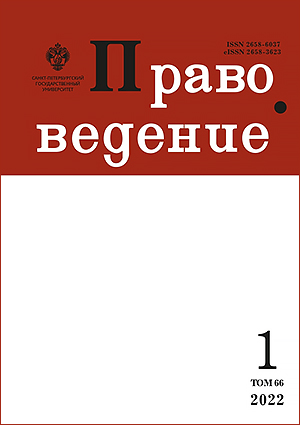Public Security and Police law in China
DOI:
https://doi.org/10.21638/spbu25.2022.101Abstract
The Chinese police performs a wide spectrum of social functions. The first part of this paper presents a daily routine of a district police station in the city of Kunming, Yunnan Province, and the various social functions they perform. Mediation among members of the local community in solving minor conflicts is one of the police’s main functions. Police officers are highly motivated in their work. Their success is measured by the degree of satisfaction of their local community. The methods of Chinese police are unique. Its force lies not so much in the extensiveness of governmental control over the life of ordinary citizens as in the wide network of personal relationships between the police and the members of the Chinese public. This network as well as the variety of functions has a single ultimate goal: public security. The second part of the paper examines the concept of public security in Chinese law. It is impossible to understand the whole of the Chinese legal system in its dynamic without taking into account the normative importance of the concept of public security or public order. In China, public order and public security are synonymous. They are understood differently from the Western legal tradition. In the West, public order is a delineation of freedom of private individuals to act pursuing their own interests. It exists to secure the individual rights and liberties. In China, it is the condition for the stability, greatness and prosperity of the Chinese nation. The third part of the paper examines the relationship between public security and human rights. It is argued that the criticism of China by the Western human rights activists fails to understand the Chinese perspective. The Chinese police’s measures restricting individual freedoms should not be understood as the violation of human rights, on the contrary, it is a protection of the majority’s essential right to public order. The idea of public security in the work of Chinese police is not simply an ideological slogan, it is an essential principle of the Chinese legal system which invigorates and innerves the work of the Chinese police.
Keywords:
China, police, public security, human rights
Downloads
References
Blasek, Katrin. 2015. Rule of law in China: a comparative approach. Heidelberg, Springer.
Cain, Geoffrey. 2021. The Perfect Police State: An Undercover Odyssey Into China’s Terrifying Surveillance Dystopia of the Future. New York, Public Affairs.
Callahan, William A. 2009. China: The Pessoptimist Nation. Oxford University Press.
Cao, Deborah. 2017. Chinese law: A language perspective. London, Routledge.
Chapman, Brian. 1968. The Police State. Government and Opposition 3 (4): 428–440.
Chen, Jianfu. 2008. Chinese law: Context and transformation. Leiden, Martinus Nijhoff.
Feng, Chuan, Leyton, P. Nelson, Simon, Thomas W. 2017. China’s Changing Legal System: Lawyers and Judges on Civil and Criminal Law. New York, Palgrave MacMillan.
Guo, Xuezhi. 2012. China’s Security State: Philosophy, Evolution, and Politics. Cambridge University Press.
Han, Ziqiang, Sun, Ivan Y., Hu, Rong. 2017. Social trust, neighborhood cohesion, and public trust in the police in China. Policing: An International Journal of Police Strategies & Management 40 (2): 380–394.
Hui, Sh. 2019. On the Identity of Public Order and Public Order Management. Journal of Beijing Police College. Vol. 2. P. 19–23. (In Chinese)
Lo, Sonny Shiu-Hing. 2016. The politics of policing in greater China. Heidelberg, Springer.
Scoggins, Suzanne E. 2018. Policing Modern China. China Law and Society Review 3 (2): 79–117.
Soloviev, Vladimir S. 1914. Pravo I Nravstvennost’ Works. Peterburg, Prosveschenie Publ. Vol. 8. (In Russian)
Tipton, Elise K. 1990. The Japanese police state: The tokko in interwar Japan. Honolulu, University of Hawaii Press.
Tocqueville, A. 1835. Democracy in America (Transl. by Henry Reeve). London, Saunders & Otley.
Twitchett, Denis Crispin, Fairbank, John King. 1978. The Cambridge History of China. Cambridge University Press 7, Part 1.
Wang, Chang, Madson, Nathan. 2013. Inside China’s Legal System. Cambridge, Chandos Publishing.
Wang, Xiahai. 2015. Empowerment on Chinese police force’s role in social service. Heidelberg, Springer.
Wong, Kam C. 2011. Police Reform in China. Boca Raton, CRC Press.
Yueh, Linda. 2013. China’s growth: The making of an economic superpower. Oxford University Press.
Zhou, Gangzhi, Li, Feng. 2020. On Security Mechanism in China and US: Comparison and Practices. International Journal of Law and Society 3.4 (2020): 154–160.
Downloads
Published
How to Cite
Issue
Section
License
Articles of "Pravovedenie" are open access distributed under the terms of the License Agreement with Saint Petersburg State University, which permits to the authors unrestricted distribution and self-archiving free of charge.




